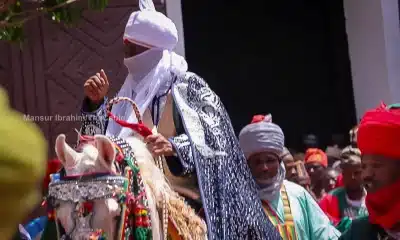Nigeria News
Uromi Killing: How ‘Northern Hunters’ Were Identified As Kidnappers With New Naira Notes, Dogs

The tragic events that unfolded in Uromi, the headquarters of Esan North East Local Government Area in Edo State, on Thursday, March 27, could have affected any other community in the region, given the prevailing tensions and fears stemming from the combined activities of suspected herders and kidnappers.
Over 24 communities in Edo Central, Edo North, and Edo South senatorial districts have already been sacked and placed under siege by criminally minded herders from northern Nigeria, while over 30 communities in Delta and Bayelsa states have also faced similar threats.
The residents in these states, especially farmers, are terrified of the brazen Fulani herders who invade their farms, destroy crops, feed their cattle, sexually assault women, and kidnap people for ransom.
Several months ago, distressed women in Uromi staged a protest at the palace of the Onojie of Uromi to voice their anger over the escalating kidnappings and killings in the area.
In January, HRH Solomon Itoya Iluobe, the Onojie of Uzea, Esan North East Local Government Area, declared that he no longer wanted any Hausa/Fulani people in their forests due to their involvement in atrocities.
“Our women go to their farms, they rape them, and at times they even set them ablaze. I have paid ransom three times to Fulani herdsmen; they kidnapped my elder sister, and they have also kidnapped two people from this place. Even last month, I paid a ransom,” said the Onojie.
In response to the escalating crisis in Delta, Edo, and Bayelsa states, there have been growing frustrations as residents continue to cry out for government intervention, but little has been done to protect them from the threats posed by the herders.
However, the situation in Uromi took a tragic turn last week when a mob roasted 16 out of 27 individuals of Hausa origin, who identified themselves as hunters traveling from Port Harcourt, Rivers State, to the northern part of the country for the Salah celebration.
The villagers believed they were kidnappers after discovering a cache of arms and ammunition with them.
The two survivors of the incident, who claimed to be hunters from Kano State, explained that the rifles recovered by the vigilantes were hunting rifles, which they insisted were licensed.
However, the vigilante group accused them of being terrorists and lynched 16 of them while five others managed to escape. Some residents disputed the claim that the victims were herders, pointing out that they were Hausa, not Fulani, and believed they were involved in the frequent kidnappings and attacks on local farmers.
There is ongoing confusion regarding the arms and ammunition found with the victims. While some locals assert that the guns were Dane guns, the police confirmed to Vanguard that the case was transferred to the Force Criminal Investigation Department (FCID), and the whereabouts of the cash and guns allegedly found with the victims remain unknown.
Ben, a non-indigene living in Uromi, condemned the act of jungle justice but acknowledged that the villagers’ suspicion was triggered by the victims’ suspicious behavior.
He told Vanguard, “Though it is regrettable, the victims’ actions provoked the mob, and their movement was suspicious.”
Prince Eugene Olumese added that the victims could have disguised themselves as hunters, as some hunters in the region carry Dane guns and dogs.
“But why were they hiding in a truck carrying palm kernel shells? Hunters don’t hide; they move freely in towns,” he questioned. He also highlighted that many of the victims were carrying large amounts of money in new currency notes, raising further suspicion.
Meanwhile, Brown Okojie, another local, questioned why the victims were hiding in a Dangote truck when they could have been traveling openly as hunters.
He pointed out that a few days before the incident, ransom payments had been made to the herders, only for the victims to still be killed. He also recounted how a pregnant woman had been kidnapped by the herders and forced to give birth while in captivity, with her newborn baby being fed to their dog.
The tragic events prompted protests from both Hausa people and native Uromi residents, though the situation nearly led to clashes before security forces intervened. Governor Monday Okpebholo, who visited Uromi on March 28, addressed the protesters. The protests were sparked by the recent withdrawal of local vigilante protection, with the residents fearing for their safety.
Governor Okpebholo’s government had previously restructured the Edo State Security Network (ESSN), turning it into the Edo State Security Corps.
However, the new administration has distanced itself from the vigilantes by recalling their personnel and ordering them to surrender their weapons. This restructuring led to a significant reduction in security coverage in the area.
To combat the growing problem of kidnapping, the state government passed a new anti-kidnapping law that mandates the demolition of properties associated with kidnapping activities. This measure has led to a crackdown on suspected collaborators, and many property owners have fled the region, fearing further demolitions. However, the tragic incident in Uromi has underscored the challenges faced by the state in curbing the rising insecurity.
As of now, the authorities continue to investigate the March 27 incident while local residents remain fearful, urging the government to take stronger action to protect them from the growing threats posed by the herders and kidnappers in the region.












